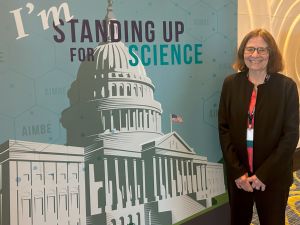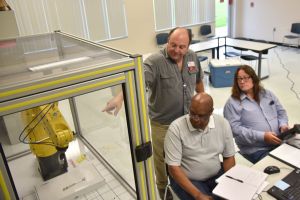Marvelous things happened this spring to the principal investigator and co-principal investigator of Industry 4.0 Skills for Manufacturing Technicians (NSF Award 2148138)—both won national accolades for their work as community college engineering technology educators.

Marilyn Barger, principal investigator (PI) of the Industry 4.0 Advanced Technological Education (ATE) project and senior educational advisor to the Florida Advanced Technological Education Center (FLATE) that she led for 17 years, was inducted into the American Institute for Medical and Biological Engineering (AIMBE) College of Fellows.
The honor recognizes her work as a registered environmental engineer, inventor of a reverse osmosis membrane, and her influence on improvements to engineering technology programs. She was the only community college educator among this year’s 122 AIMBE inductees who were from industry or research universities.
Husam “Sam” Ajlani, co-PI on the Industry 4.0 ATE project and associate professor of engineering technology at the College of Central Florida, received the Dale P. Parnell Faculty Distinction from the American Association of Community Colleges. He was one of 42 community college educators to receive the 2023 recognition for “instructors who go above and beyond to help their students find academic success.”
Ajlani, who worked in industry for nearly 30 years before becoming a full-time community college educator, says he loves teaching. “It’s one of my favorite things to do. I see more impact in this than I did as an engineer … You can see impact daily. I mean somebody ‘gets it.’ You know some concept. The look on their face—the excitement they get when they understand something—is wonderful,” he said during a Zoom interview.
Assistance from FLATE

The College of Central Florida is not the first college where Ajlani has grown an ET program’s enrollment while bridging relationships with industry. But he credits Barger and others at FLATE with helping him understand Florida’s higher education system when he came to the college from Lanier Technical College in Georgia. Their introductions at FLATE’s ET Forums were also very helpful. As co-PI of the Industry 4.0 project, Ajlani now chairs those twice-a-year meetings that FLATE convenes with geographically dispersed educators.
“FLATE is the one that got me on target and going,” Ajlani said. It’s the type of assistance FLATE has offered to community college educators in Florida and elsewhere for nearly two decades.
Barger, as FLATE’s executive director from 2004 to 2020 when it was funded by the National Science Foundation as a regional and then national ATE Center of Excellence in manufacturing, led the development of a Florida-wide ET curriculum with degrees and certificates aligned with national industry certifications. Barger’s efforts not only ensured that secondary school and community college educators had access to the professional development they needed to execute the new curriculum, she coordinated strategies that promoted ET careers, ET education programs, and industry partnerships.
Sustainability & Other Accomplishments
In recent years she accomplished the significant feat of sustaining FLATE’s work after its ATE center grants sunset. FLATE moved from Hillsborough Community College to FloridaMakes, a public-private partnership operated by an alliance of Florida's regional manufacturer associations and other organizations that serve manufacturers.
In addition to leading the Industry 4.0 grant, Barger is currently co-principal investigator of four other ATE grants. These include The Hidden Innovation Infrastructure (NSF Award 2026262) with Rutgers University researchers who are analyzing the economic impact of the ATE program, and PathTech LISTEN (NSF Award 1801163) with University of South Florida researchers who are following the career paths of students in ET, advanced manufacturing, and biotechnology programs.
Barger received a bachelor’s degree in chemistry from Agnes Scott College, a bachelor’s degree in engineering science from the University of South Florida, and a Ph.D. in civil and environmental engineering from the University of South Florida. Her doctoral research led to U.S. Patent Award 6,632,357: Reverse Osmosis (RO) Membrane System Incorporating Function of Flow Channel Spacer that is used in some portable water filtration devices.
She spent four years as assistant professor at Hofstra University. She was then the founding faculty member for the environmental engineering program at Florida State University for four years before going to Hillsborough Community College in 1999 to manage its manufacturing technology program.
Florida-wide ET Advisory Board in the Works
When Barger was interviewed via Zoom in April she was excited about FLATE’s effort to form a new Florida-wide industry ET advisory board. Industry partners were mulling a draft of the bylaws for an organization that would work alongside the Florida Department of Education’s career technical education division to maintain the engineering technology curriculum.
“We think it’s a good thing for the state since we all have basically the same program, that we’ll be able to bring more visibility to the program,” she said.
She cites Ajlani’s expansion of Central Florida’s ET program from “a bunch of equipment jammed into one classroom” to an entire building as an example of what is possible to meet the needs of both students and employers.
Ajlani Modernizes Program
In the College of Central Florida (CF) announcement of Ajlani’s award, Rob Wolf, dean of business, technology and career, states: “In nearly 10 years at CF, Associate Professor Ajlani has modernized our engineering technology program with cutting-edge technology and has leveraged community partnerships to create apprenticeship opportunities ... We are currently training more than 100 engineering technology students for high-skill, high-wage local jobs with a nearly 100% job placement rate.”
Ajlani is proud that his program graduates qualify for high-paying jobs and that their employers call him asking for more students like them. About 30% of his program’s alumni enroll in baccalaureate engineering programs. He worked as a technician while pursuing his engineering degree at the University of Florida so he knows this career path well. He estimates that about 10% of his program graduates return to CF’s baccalaureate of applied science in logistics. He and colleagues developed it to fit hand-in-glove with the needs of employers like Fed Ex that have large warehouses nearby.
Ajlani’s competitiveness comes out when he describes overcoming the challenges to bring an authorized FANUC training center to campus. “It took five years, but I got it done,” he said. As a result, students have the opportunity to learn on 20 robots and interact with a wide array of employed people whose companies send them to the college for training.
Partnerships Lead to New Initiatives
“That’s great synergy for his program,” Barger said.
“We work hard really hard with FANUC and the local industries to promote robotics,” Ajlani said. Aside from bringing more technicians with robotics skills into the workforce, the partnerships with FANUC and companies with Central Florida facilities instigated new programs at the college.
For instance, Lockheed Martin initially sent engineers to train on the FANUC robots. Now it also sends technicians to campus for soldering training, which can lead to them earning higher wages. These successful experiences have led to Lockheed Martin and the college collaborating on an electronics apprenticeship program.
“The biggest thing is the partnership we have,” he said.
For their Industry 4.0 ATE project, Barger and Ajlani are developing a certificate program for data collection and data management to address gaps that they and industry partners have identified. They are also partnering with Daytona State College educators to develop more complex cybersecurity courses for technicians who will increasingly interact with “smart” manufacturing equipment.
New technologies keep emerging and neither Barger nor Ajlani are resting on their laurels.
 Subscribe
Subscribe


 See More ATE Impacts
See More ATE Impacts
Comments
There are no comments yet for this entry. Please Log In to post one.